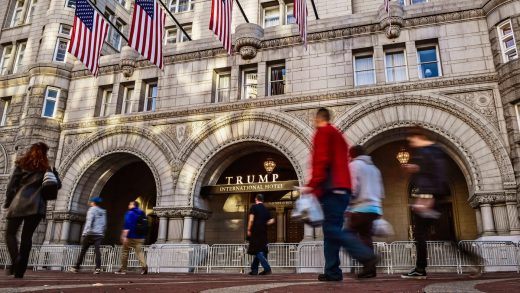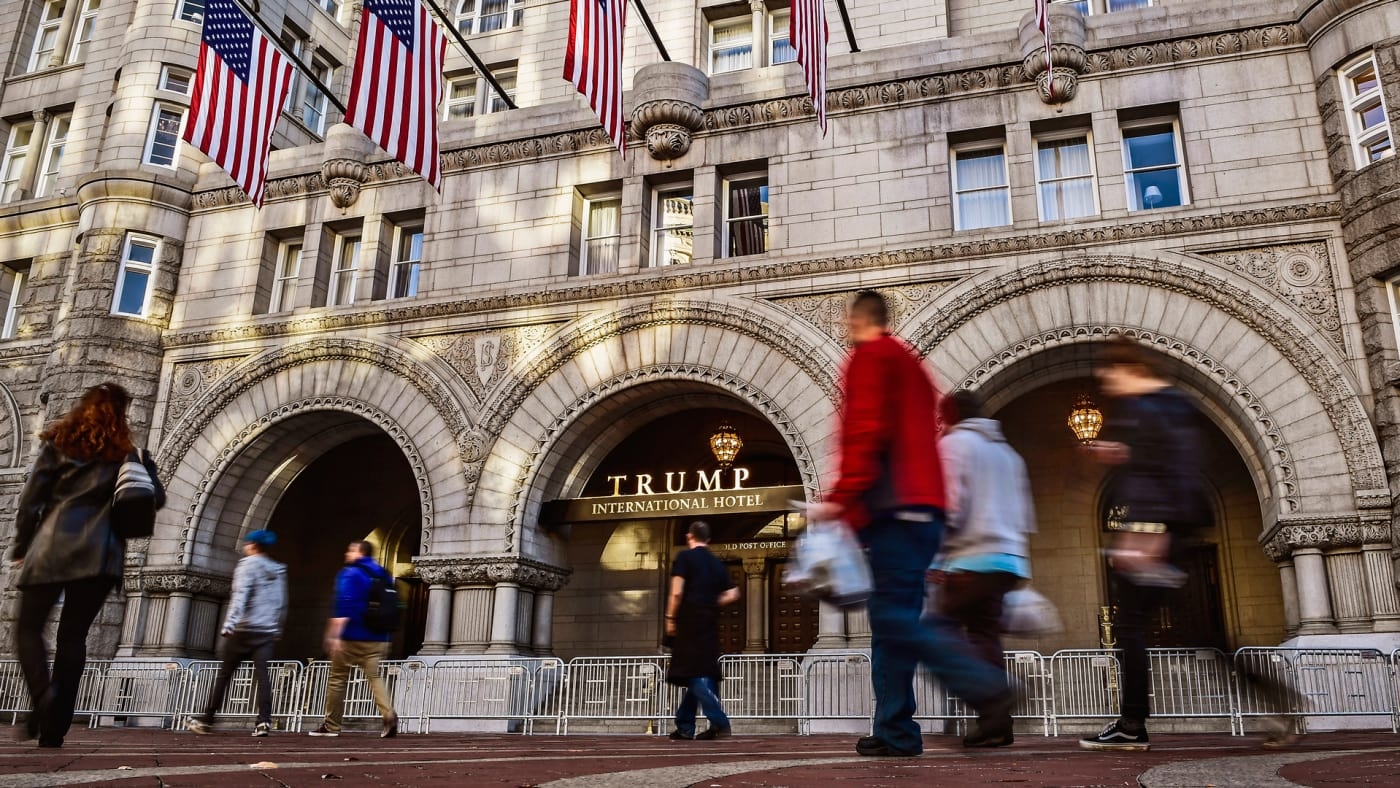How Trump’s D.C. hotel works to help swamp the drain
“Only fools, or worse, are saying that our money losing Post Office makes money with Amazon,” President Donald J. Trump tweeted on April 2, 2018. It was just one of the president’s many jabs at Amazon, repeatedly claiming that the U.S. Postal Service, which has a deal with the e-commerce giant to deliver packages on Sundays, is losing billions of dollars at the expense of U.S. taxpayers.
But one former post office appears to have made money from Amazon recently—the Trump International Hotel, D.C., which is located at the city’s historical Old Post Office (after the Trump Organization negotiated a long-term lease of the building from the government). The five-star luxury hotel has become a prime hangout for corporate lobbyists and foreign government officials who appear to be trying to curry favor with the Trump administration by spending money on dinner, booking expensive suites, and holding corporate events (rates start at $1,000 per day, plus $4,000 food and beverage minimum). A month and a half ago, Amazon Web Services (AWS), Amazon’s cloud computing division, which claims to serve more than 2,000 government agencies, was a silver sponsor of a major conference of government contractors held at the the five-star luxury hotel.
The 2018 Alfresco Government Summit on May 22 promised to help attendees from “all levels of government and industry” . . . “get real about where your agency is when it comes to phasing out paper, streamlining business processes, and leveraging the power of open source and cloud technologies.” Three U.S. government career employees also attended the summit.
Trump, who has attacked Amazon on Twitter at least six times so far this year, hasn’t shamed the company since April 5. That a company publicly assailed by the president subsequently sponsored an event at that same president’s hotel—from which he can still profit—concerns government-ethics authorities. The profits go to the Trump Organization, and though the president’s business empire is now held by a trust, it’s not a blind trust, and he’s allowed to withdraw money from his enterprises at any time.
“You have multiple levels of potentially inappropriate mixing of private business and the presidency. That seems like a problem,” said Noah Bookbinder, a former federal corruption prosecutor and executive director of Citizens for Responsibility and Ethics in Washington, a government watchdog involved in two emoluments lawsuits against Trump.
“I certainly don’t blame Amazon for trying to get out from under the potential effects on their businesses from attacks by the president. But, when the president has created the situation where companies that want more positive treatment by him or by the administration feel like they can get that by essentially giving him money through his businesses, that’s a problem. That’s not the way our government should work.”
In 2017, which appears to have been the Alfresco Government Summit’s first year, it was held at Nationals Park, and AWS was a sponsor then, too. AWS has had government contracts for years, including a $600 million, 10-year deal to provide cloud services to the CIA and intelligence agencies. And it’s in the company’s interest to stay in the good graces of the administration—its government contracts in total could be worth as much as $2.8 billion this year and $4.6 billion by 2019, reports the Wall Street Journal. And it’s in the running for a 10-year contract worth $10 billion with the Pentagon.
Amazon has not replied to requests to discuss its motives for cohosting an event at the president’s hotel, how much it paid, and if it had anything to do with the Alfresco Government Summit’s change of venue for 2018. A spokesperson for Alfresco, an enterprise software firm and the event’s principal sponsor, wrote in an email to Fast Company, “Alfresco is bipartisan in its approach and only booked the venue at the Trump International Hotel because it was the only space available to accommodate their event during the time they needed it.” He declined to answer any other questions, including a request to substantiate that every single meeting space in metro Washington, D.C. other than the president’s hotel was booked on May 22, 2018. Shortly after Fast Company contacted Alfresco about the government summit, the event’s web page was taken down (a cached version is available via Google).
White House deputy press secretary Lindsay Walters declined to comment.
Appearance of government officials concerns ethics experts
None of the six other U.S. government contractors that also sponsored the summit (which hasn’t been reported about previously) replied to inquiries about their motivation for patronizing the Trump Organization’s hotel. In addition to AWS and Alfresco, these companies are technology firm Armedia, management consultant and information technology (IT) company CALIBRE Systems, IT consultant Network Designs, enterprise information-management consultancy Acuity Systems, “open-source solutions provider” Carahsoft, and “content services system integrator” XeniT.
The three U.S. government employees attended the summit to discuss modernizing records management and digitalization (as they did at last year’s conference, which took place at a different locale).
Lisa Haralampus, director of records management policy and outreach for the National Archives and Records Administration, and Mark Patrick, chief of the joint chiefs of staff’s information-management division, told Fast Company they did not spend government funds at the hotel. “I frequently speak at these types of events to inform the records management community of government policy and intentions, while receiving valuable feedback in return,” Haralampus wrote via email. And per his LinkedIn profile, Patrick’s job duties include “Present/speak to government and private sector organizations on information management by request.” Tim Crawford, a senior policy adviser and project manager for FOIAonline with the EPA, was not granted authorization from the EPA to speak to the media in time to reply to questions. (Fast Company has filed Freedom of Information Act requests for communications involving all three government officials’ decisions to attend the summit.)
Despite officials’ claims that taxpayer money was not spent at the hotel during the summit, their appearance at the president’s hotel concerns Bookbinder. “It seems to suggest kind of an endorsement of these folks by the administration. That may not have been what was intended,” he said. “But when the president’s business is offered up for whatever companies want to pay for its use, you run the risk of creating that appearance of an official endorsement. Which is a problem.”
The Alfresco Government Summit is hardly the only event hosted at the president’s D.C. hotel where organizers have a reason to want to please President Trump, of course.
Vaping industry lobbyists are back for a return visit
Last week, the Vapor Technology Association (VTA), which represents the burgeoning industry and is committed to “smart regulations and responsible public policies,” returned to the hotel for “Vape and the FDA 3.” Last year, its two-day conference at the hotel, featuring 200 industry professionals from 67 companies strategizing about how to lobby the Food and Drug Administration and highlighted by a keynote address from Senator Ron Johnson (R-WI), was cited as one of the most blatant examples of a special interest group that appeared to benefit from patronizing the president’s business: Ten days after the hotel hosted the conference, the Food and Drug Administration (FDA) delayed implementing a regulation that would have required some e-cigarettes and cigars to get FDA approval, the Associated Press reported last year.
This year, there are new challenges for the industry: In March, the FDA announced a proposal that could restrict “youth-appealing” flavors in tobacco products. This year’s VTA conference featured a high-powered industry lawyer saying that his recommendation to the FDA is that it’s too early to regulate flavors based on the current science. “They have to wait for the science to mature before they decide how to handle it,” Eric Heyer, an attorney with Thompson Hine LLC, told the crowd.
And this year’s keynote speaker was Congressman Ryan Costello (R-PA), who offered his advice for how the industry’s lobbyists should talk to his fellow members of Congress. “If there’s one thing elected officials want to be on the right side of, it’s job creation,” he said. “Lead with: improved public health outcomes from those switching, and then the economic impact. How many jobs will this legislation cost? How many small businesses will close? That’s what legislators need to know.” The next day, industry reps from dozens of states hit Capitol Hill to lobby their representatives.
“Our organization selects the location of our annual conference based on factors such as proximity to Capitol Hill and cost,” Tony Abboud, VTA’s executive director, said when asked about this year’s event. “We solicit proposals from a variety of properties. This property provided the best price for our many small business owners and remarkable service in a historic venue close to Capitol Hill.”
The American Turkish Council/Turkey-U.S. Business Council’s annual conference on U.S.-Turkish relations also is coming back to the Trump Hotel D.C. this fall, as is the Paralyzed Veterans of America’s Mission: ABLE Awards.
As for groups with reasons to want to make the president happy that are moving their events to the Trump Hotel D.C. this year, the Border Patrol Foundation’s 10th annual recognition dinner is scheduled there for October (from 2015 through 2017, it’d been held across the street at the JW Marriott). The hotel is hosting food-service distributor Labatt for two different three-night sales trips this summer, and each trip appears to be bringing more than 100 guests to the hotel.
And then there’s the International Federation of Pharmaceutical Wholesalers; its biennial general membership meeting—where it “strives to provide companies with the insight needed to be successful in a changing marketplace and showcase the industry from the perspective of pharmaceutical distribution”—will be at the Trump International Hotel D.C. in October. “When you have the president claiming to want to take action on controlling drug prices at the same time his company is getting paid by pharmaceutical special interests that probably have a very different interest on that issue, that raises a question of whether he’s deciding these kinds of issues—that are important issues for the American people—based on what’s in the public interest, or based on who’s paying him,” Bookbinder said.
As for hotel executives, they don’t seem to have qualms pursuing clients whose business could be considered to be a conflict of interest for the hotel’s owner.
On June 27, for example, the hotel’s director of corporate sales, Christopher R. Monico, emailed members of an association, reminding them that the hotel is part of the association’s preferred rate program and advertising its special promotional rate and complimentary upgrade for the group’s members. Also, if they book a room, to “forward me a copy of the hotel confirmation so I may personally look after the reservation.”
That group? The American Bar Association, the national voice of the legal profession.
(13)



